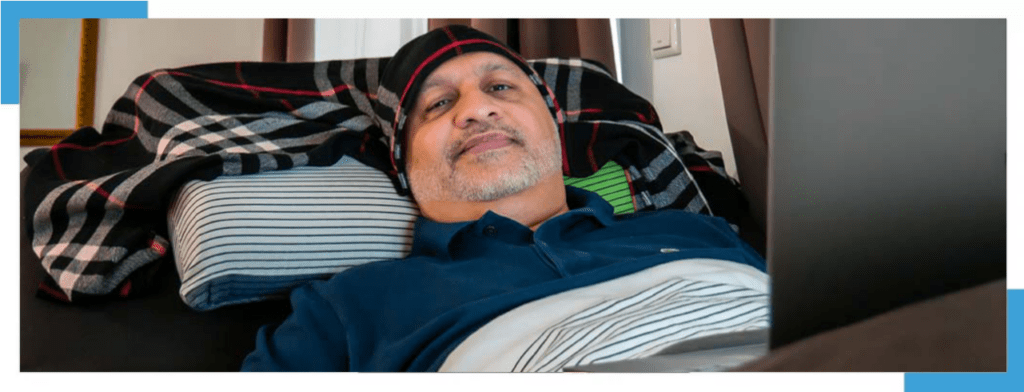Publisher: Rolling Planet - 8. November 2021
Khalid Nadeem Arif has Chronic Fatigue Syndrome and spends most of the day lying down. But that doesn’t stop him from running an international company.
Khalid Nadeem Arif (52) has Chronic Fatigue Syndrome (CFS), a severe condition that causes extremely rapid and persistent exhaustion. On good days, he can sit and take a few steps with crutches—but most of the time, he lies in a darkened room, often unable to get up or even speak. Surprisingly, Arif manages an international business with more than 200 employees right from his bed.
“Nobody Could Find Anything Abnormal About Me”
Arif was born in Lahore, Pakistan, in 1969. Via Sweden, he arrived in Germany as a refugee at the age of 16. After finishing secondary school and dropping out of a business-assistant training program, he first ventured into self-employment in the design, production, and sale of eyeglasses. About 25 years ago, he shifted his company’s focus to IT services, and his office soon became one of his favorite places to be.
All that changed in 2007 when he experienced his first CFS flare-up.
“I was suddenly paralyzed for many days,” he recalls.
Arif could barely move or speak, spending days in bed or on the couch. The former competitive athlete, who did Taekwondo for almost 20 years, thought he would not survive. He wrote down all his company’s important passwords and login details and told his wife she could find them in the safe. It never went that far, but his health problems continued.

For nine years, Arif went from doctor to doctor, saw alternative practitioners, stayed in hospitals, and consulted various specialists, but no physical cause was found. The only diagnosis they gave was: Depression. Then he went through years of therapy and took psychiatric drugs, which led to even more severe pain. Looking back, Arif says this treatment caused suffering that could have been avoided.
Years later, a coincidence changed Arif’s life completely: a TV report about the rare disease CFS.
“Tears ran down my face; I thought they were telling my story,” he recalls.
Through a support group, he found a specialist who finally made the correct diagnosis. Even though the disease cannot be cured or treated, he tells ROLLINGPLANET he has been living a different and better life since then.
What Is Chronic Fatigue Syndrome?
Chronic Fatigue Syndrome (CFS) is characterized primarily by extraordinarily rapid physical and mental exhaustion. In severe cases, it can lead to significant disability or even the need for nursing care. Even minimal exertion can be draining, and recovery may take days or weeks. The exact causes are unknown.
Beyond the primary symptoms, many patients also experience neurocognitive impairments that may be triggered by exertion. These can include slowed thinking, difficulty concentrating, confusion, trouble finding words, slowed speech, dyslexia, pain, sleep disturbances, neurosensory disorders, problems regulating body temperature, and breathing issues.
There are no exact statistics for Germany, but estimates say there are about 300,000 to 400,000 people affected. Most get sick between the ages of 30 and 45; women are affected three times more often than men. The illness cannot be cured or treated.
Giving Up Was Never an Option
Giving up work was never on the table for Arif—his company is his passion. He reorganized his business, which now provides IT and personnel services. The shift toward remote work, making it possible to work from anywhere in the world, proved to be the most crucial step for future growth. Today, his employees—from over 20 countries—primarily place Indian programmers with national and international clients. An added bonus of this restructuring: The COVID-19 pandemic did not cause any problems for Arif’s team.
“In COVID terms, I’ve basically been in a strict lockdown for many years,” he says.

At Outsourcing4work, the management team is responsible for creating the processes. This way, he stays free from day-to-day business and can focus on the company’s strategic direction. His employees mostly communicate with him by text messages and emails, as he is unable to attend meetings due to his illness.
Despite his condition, Arif works 60 to 80 hours a week. He says CFS has damaged his internal clock, and he often stays awake late at night. Most of his time goes to eLearning courses, staying in touch with employees, and analyzing competitors and market conditions. He also does not need to leave the couch for conferences, presentations, or talks:
“Everything is on YouTube—a real gold mine,” he says.
Using Digitalization for Inclusion
Arif hesitated for a long time before speaking publicly about his experiences. After all, people expect a successful entrepreneur to be strong and ever-present, he says. But he wants to inspire others with disabilities. Arif wants to show how digitization and decentralized, flexible organizational structures can open doors for people with disabilities— especially by making integration easier:
“A severe disability should never be a disqualifying factor.”
To help other businesses adopt such organizational models, his company regularly hosts webinars.
Arif has big plans for the future—and also wants to give something back. Over the next five years, he aims to create 1,000 new remote jobs in his hometown of Rabwah in Pakistan. These jobs will offer promising, well-paid opportunities for local residents to support their families.



